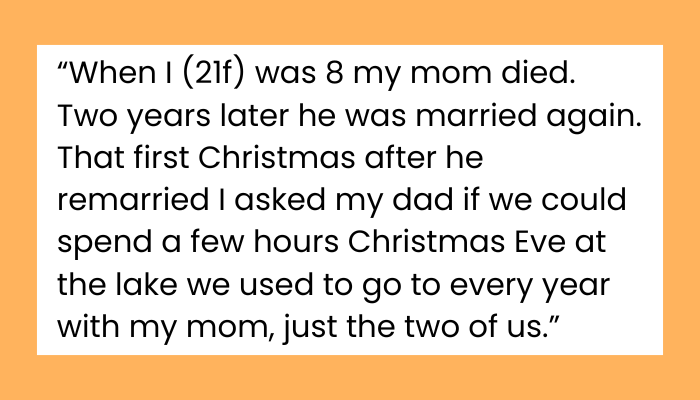When Your Sister Suddenly Pretends You Don’t Exist
I’m in my early 30s and there’s something that’s been quietly tearing at me for years: my older sister — five years older — has been completely ignoring me for over a decade. I still have no idea why. Things were fine the last time we saw each other: her birthday, cake, smiles, a suggestion to hang out. A few weeks later she proposed and then… nothing. No “let’s pick a day,” no follow‑up, just silence. No clue.
Meanwhile, she keeps contact with our other sisters. Then I found out something weird: she has me blocked on Instagram. I hadn’t even known she had the account. Turns out our mom tried to share her post with me and I couldn’t see it. That hit hard. To add insult to injury, our parents keep telling me she “does care” and “loves” me — while also learning she told our mom not to share her new home address with me. What?! I literally have done nothing. I haven’t asked questions or pushed. I just backed off, assuming if someone doesn’t want me in their life, I’ll respect that. But it feels surreal. And I’m trying to figure it out: do I reach out? Do I let this slide? Is it worth it?
When your own sibling erases you from their life, it leaves a hollow mix of confusion, hurt, and disbelief that no amount of time seems to fix

The author noted that their sister has been acting like they don’t exist even though the last time they were together, they were celebrating her birthday

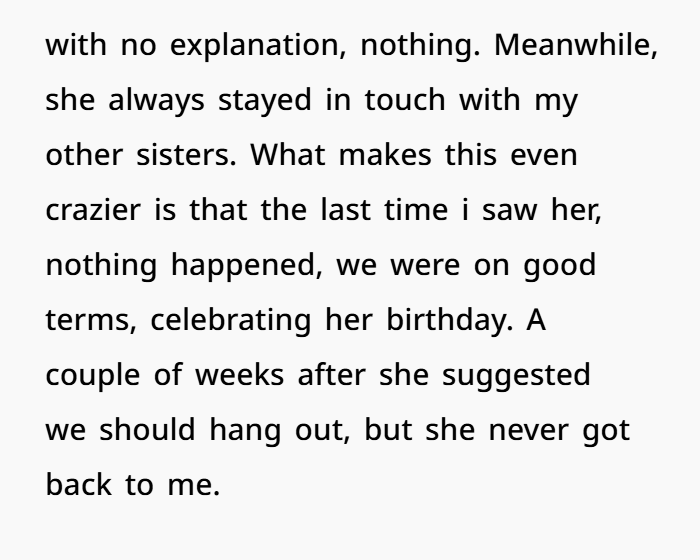
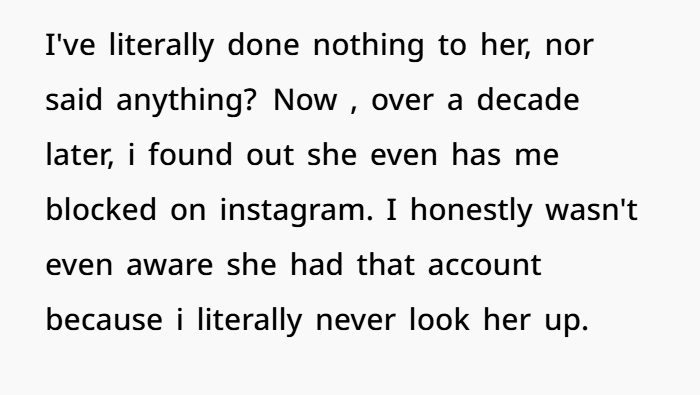


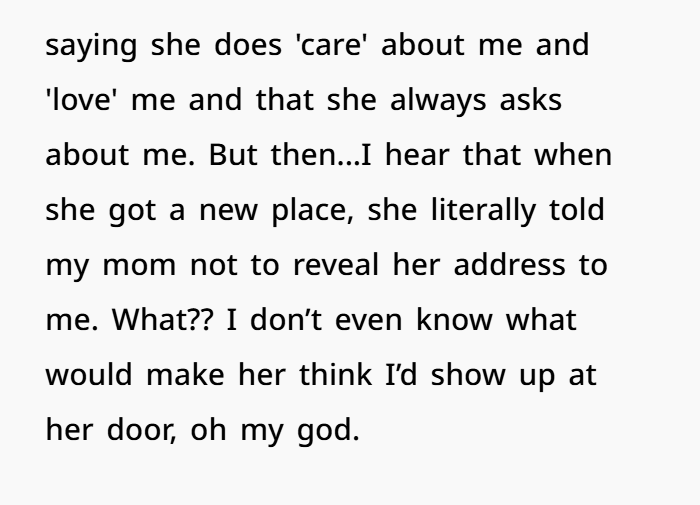
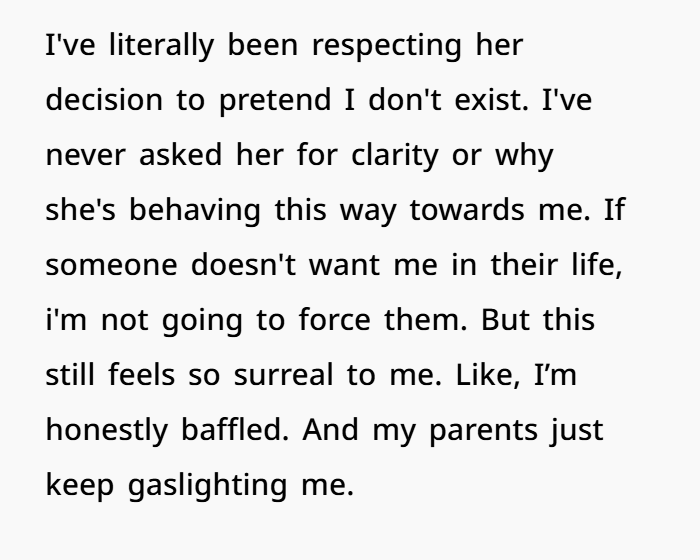
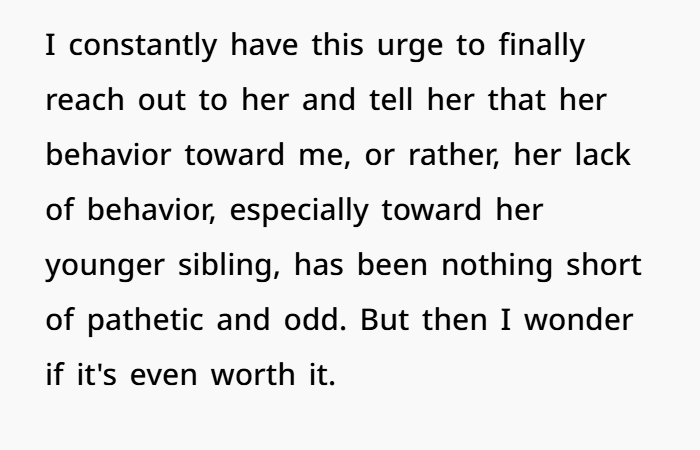
Here’s the part where we dig in. Because what you’re going through isn’t just personal — there are patterns, research, and real emotional work involved. I’ll break down what happens when a sibling cuts you out, why this might happen (even when you feel you did nothing), and what you can consider doing. I’ll try to keep it real, simple sentences, no fluff.
How common is it?
- One big study found that about 28% of adults had experienced estrangement from at least one sibling (lack of contact or emotional closeness) in a 6‑year span. ResearchGate+2PsyPost – Psychology News+2
- Another survey found common reasons for sibling estrangement: personality conflicts (29%), lies or betrayal (29%), and manipulative behaviour (26%). YouGov
- So you’re not totally alone in this. Yet it still feels lonely.
Why might it happen — even if you feel you did nothing
Sometimes the root causes aren’t obvious or conscious. It may not be about you in a direct way — but about dynamics, wounds, or unspoken things. Some possible factors:

- Different personality/values: Sometimes siblings drift apart because they change, one grows in a direction the other doesn’t, or one becomes someone the other doesn’t want to recognise. One article says siblings shape our identity deeply so big changes can shake things up. Psychology Today
- Accumulated hurt or unspoken resentment: If early on there was perceived unfairness, favouritism, or rivalry (even subtle) it might lay a foundation for silence later. Eggshell Therapy and Coaching+1
- Life events, shifts, transitions: Divorce of parents, death in family, big changes — these tend to make sibling ties more vulnerable. ResearchGate
- One person chooses to cut off: Estrangement often involves at least one person making a decision to stop contact or emotionally detach. Psychology Today
- Lack of clarity + freeze: Because nothing was said (in your case), sometimes the other sibling may have initiated a freeze for reasons you’ll never know — fear, guilt, shame, a perceived slight you weren’t aware of — and then it becomes “normal” for them.
What it does to you emotionally
- Sense of loss even though no one died. You lose the what‑if, the sibling connection you expected. Healthy sibling relationships shape you deeply. Psychology Today+1
- Trust issues: If someone you thought was close can just disappear, you might think “If they can, maybe others will too.” Researchers say estrangement can trigger low self‑esteem, hyper‑vigilance, people‑pleasing. Psychology Today
- Confusion and self‑blame: Since you don’t know why, you may keep revisiting “What if I did something?” or “What if I did something wrong?” That can fuel anxiety.
- Family dynamics get weird: Your parents telling you she cares but hiding her address. Mixed messaging. That’s confusing and invalidating.
What you can consider doing
Since you’re respecting her space (which is healthy in many ways), you already have self‑control going on. Here are other things to think about:
- Decide what you want: Do you want a relationship with her, or do you want peace of mind? Those are different goals. If you want relationship, maybe some modest effort; if you just want peace, maybe acceptance.
- Reach out gently, one time: If you feel like it, you could send a message like: “Hey, I’ve noticed we haven’t spoken in years and I don’t know why. If you’re okay, I’d like to reconnect. If not, I understand.” No pressure, no guilt‑trip.
- Set internal boundaries: If she still stays silent, then you decide how much emotional energy you give this. Because living in limbo drains you.
- Work on your side: Therapy, journaling, talking to friends. Even if you don’t get answers, your feelings are valid. The research says estrangement does affect well‑being. Wiley Online Library+1
- Re‑frame the narrative: Instead of “What did I do wrong?” you might adopt: “Something changed on her end, maybe unrelated to me.” You’re not responsible for everything just because you’re in the picture.
- Let go of controlling the outcome: You can’t make her want you. If you’ve reached out and she says nothing (or blocks again) — then your job is to protect your peace.
- Stay open to apology or explanation: If one does come, you can decide if you want to respond. No rule says you must.
- Work on other relationships: Investing in friends, other siblings, community. Cultivate places where you feel seen.
- Be gentle with yourself: This is painful. It’s not a rejection of you necessarily, but it feels like one. Healing takes time.

Is it worth reaching out?
Short answer: Maybe. It depends on your goal. If you believe there’s a chance she’ll respond and you’re okay with not knowing, then yes. If you reach out and it wilts into nothing, you’ll need to pick up your heart and move on — so decide if you’re OK with that risk.
Given that she’s blocked you and actively avoided sharing her life details with you (address), that’s a strong signal she wants distance. So it could also be that you already have the answer: she’s chosen distance. If you accept that, you can move from confusion to clarity.
What this means for you moving forward
- Accept that not all sibling relationships are forever. That’s hard, but research backs it. ResearchGate+1
- Value the siblings and relationships you do have.
- Stop assigning worth to someone else’s behaviour. Her ignoring you doesn’t reduce your value.
- Create your own narrative: “I tried. She didn’t. I still respect myself.”
- Let silence be the answer for now — not a wound you keep reopening.
Netizens expressed sympathy for the author, but suggested that their parents might be playing a part in the estrangement
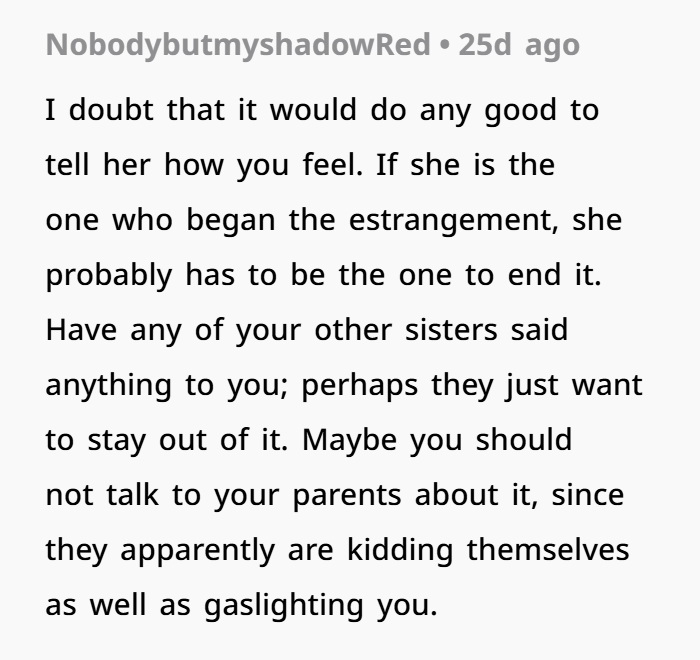
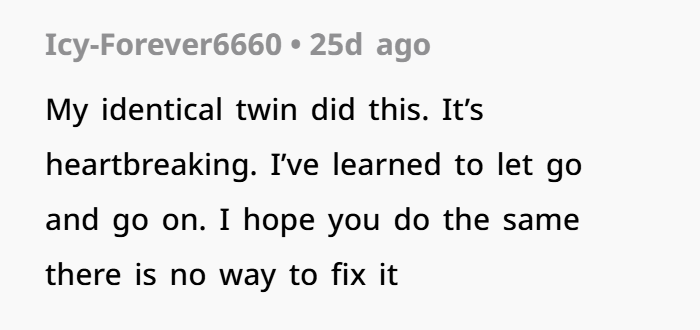
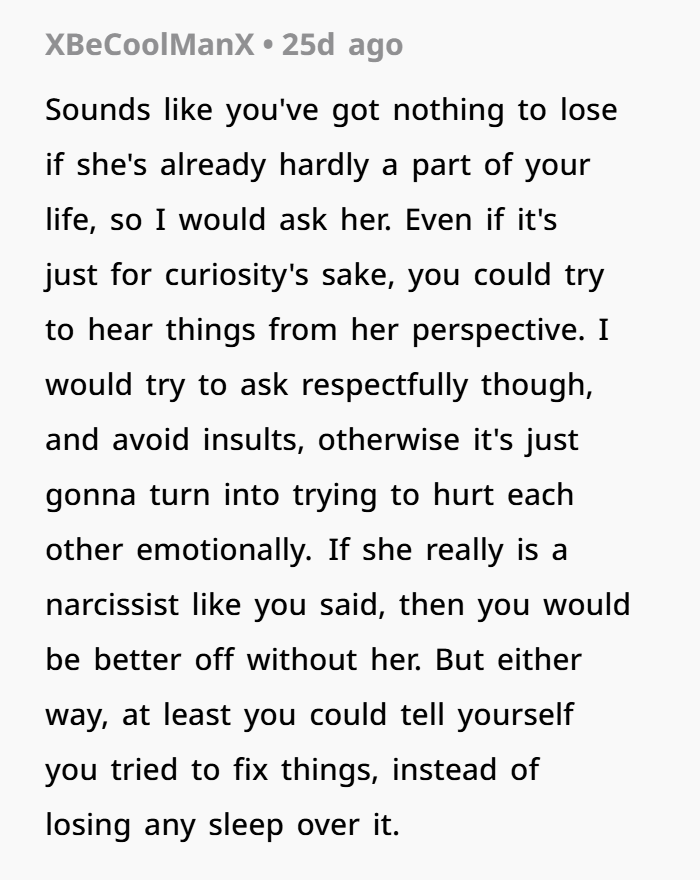
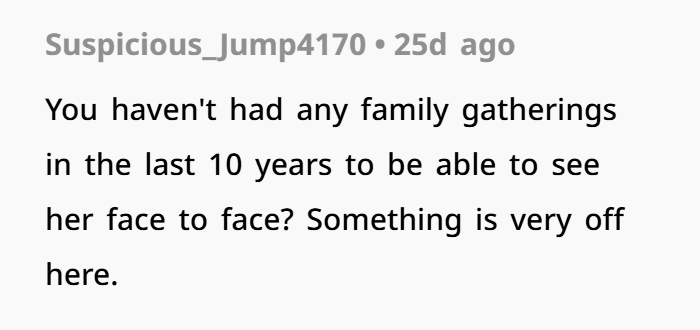
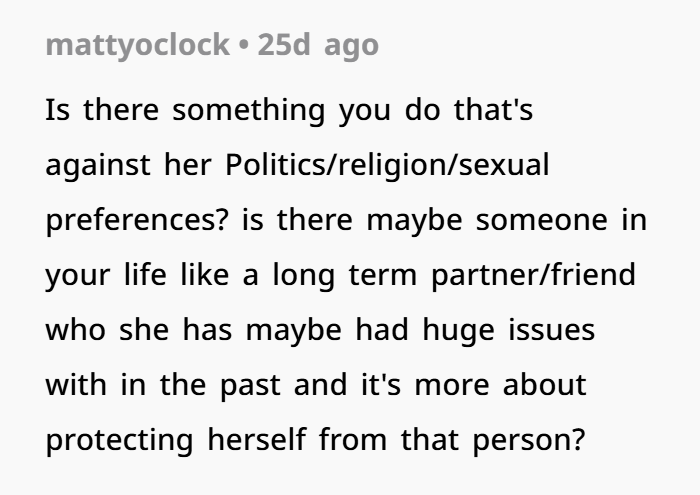

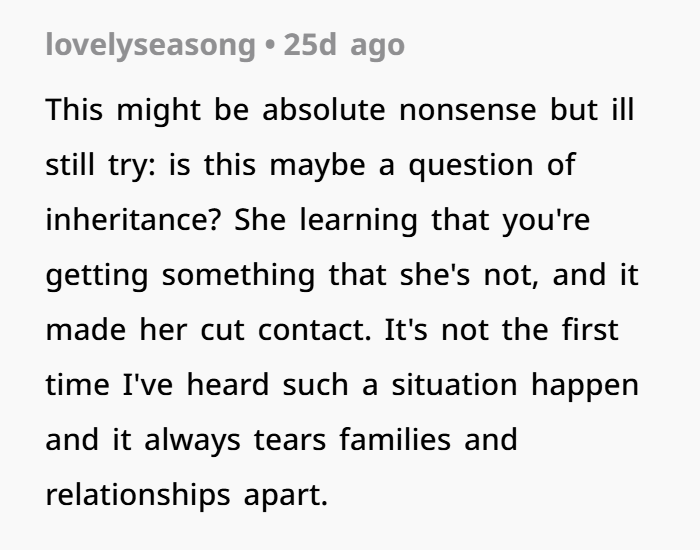
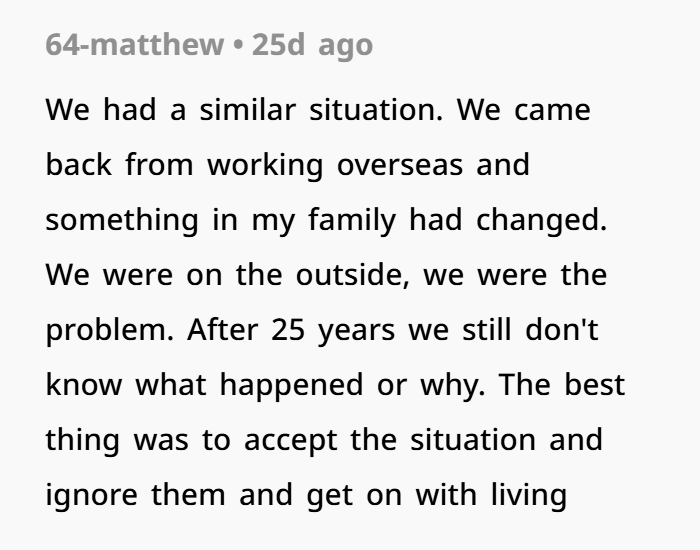
You’re dealing with something heavy: a sister who acts like you don’t exist, with no explanation. And that limbo is one of the worst feelings — the “why” that never comes. But you’re not doomed to live in that place forever. You can decide your next move: reach out with an open hand, or adjust your life and expectations and heal.
Just remember: Silence from someone else is data. It tells you something, even if it’s not the full story. And healing isn’t about forcing a story to make sense—it’s about finding peace despite the missing pieces.





